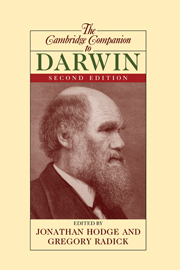Book contents
- Frontmatter
- Introduction
- Part I Darwin’s theorising
- Part II Historical contexts
- Part III Current issues
- 11 From Darwin to today in evolutionary biology
- 12 Metaphysical and epistemological issues in modern Darwinian theory
- 13 Darwinian concepts in the philosophy of mind
- 14 Darwinism in moral philosophy and social theory
- 15 Belief in God in a Darwinian age
- Part IV Philosphical prospects
- Guide to further reading
- List of references
- Index
11 - From Darwin to today in evolutionary biology
from Part III - Current issues
Published online by Cambridge University Press: 28 May 2009
- Frontmatter
- Introduction
- Part I Darwin’s theorising
- Part II Historical contexts
- Part III Current issues
- 11 From Darwin to today in evolutionary biology
- 12 Metaphysical and epistemological issues in modern Darwinian theory
- 13 Darwinian concepts in the philosophy of mind
- 14 Darwinism in moral philosophy and social theory
- 15 Belief in God in a Darwinian age
- Part IV Philosphical prospects
- Guide to further reading
- List of references
- Index
Summary
For nearly one-and-a-half centuries, biologists interested in evolution have been haunted by the question of whether their conceptions are or are not 'Darwinian'. While it may not be unique, this persistent positioning of new developments in relation to a single, pioneering figure is quite exceptional in the history of modern natural science. Physicists currently working in the domains of relativity or quantum theory may refer sometimes to Einstein or Bohr; but their debates are not massively structured by this reference as evolutionary theory has been and remains structured by reference to Darwin. A proximate cause of Darwin's enduring presence is that evolutionary biologists have never stopped reading him. The remarkably numerous editions and translations of Darwin's books have in themselves helped to make this possible. But the availability of key texts only takes us so far in understanding why evolutionary biologists go on reading Darwin, referring to him, feeling the necessity of labelling their theories as 'Darwinian' or 'non-Darwinian' or 'anti-Darwinian'. Indeed, on the face of it, there are compelling reasons for modern biologists to avoid affiliating their work with Darwin's. Darwinism does not belong only to the history of science; it also belongs to cultural and political history. Among other things, neo-liberal economics, social Darwinism, racial anthropology, Nazi ideology and the materialistic monism of Darwin's German supporter Ernst Haeckel had strong interactions with Darwinism in the first century of its history.
- Type
- Chapter
- Information
- The Cambridge Companion to Darwin , pp. 277 - 301Publisher: Cambridge University PressPrint publication year: 2009
- 5
- Cited by

